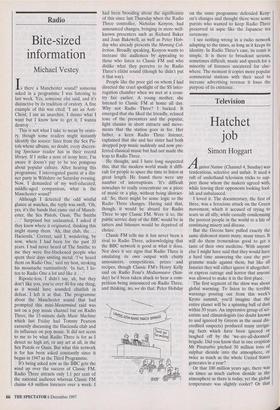Radio
Bite-sized information
Michael Vestey
Is there a Manchester sound? someone asked in a programme I was listening to last week. Yes, someone else said, and it's distinctive by its tradition of oratory. A fine example of this was cited: 'I am an Anti- Christ, I am an anarchist, I dunno what I want but I know how to get it, I wanna destroy ...'
This is not what I take to mean by orato- ry, though some readers might instantly identify the source: lines from the Sex Pis- tols whose albums, no doubt, every discern- ing Spectator reader has in their record library. If I strike a note of irony here, I'm aware it doesn't pay to be too pompous about popular culture. After hearing this programme, I interrogated guests at a din- ner party in Wiltshire on Saturday evening. Now, I demanded of my well-educated, middle-aged companions, what is the Manchester sound?
Although I detected the odd wistful glance at watches, the reply was swift. `Oh, yes, it's the bands that came out of Manch- ester, the Sex Pistols, Oasis, The Smiths . . .' Surprised but undaunted, I asked if they knew where it originated, thinking this might stump them. `Ah, that club, the ... Hacienda.' Correct, said I, wondering, by now, where I had been for the past 20 years. I had never heard of The Smiths; to me they were fire-blackened people who spent their days smiting metal. 'I've heard them on Radio One,' said my host, stroking his moustache ruminatively. 'In fact, I lis- ten to Radio One a lot and like it ...'
Riposte-less, I didn't say, ah, but they don't like you, you're over 40 for one thing, as it would have sounded churlish in defeat. I left it at that. The programme about the Manchester sound that had prompted this mini-Mastermind raid was not on a pop music channel but on Radio Three, the 15-minute daily Music Machine which last Friday had Tommy Pearson earnestly discussing the Hacienda club and its influence on pop music. It did not seem to me to be what Radio Three is for as I detect no high art, or any art at all, in the Sex Pistols or Oasis. But what this network is for has been asked constantly since it began in 1947 as the Third Programme.
It's being asked now as the BBC gets the wind up over the success of Classic FM. Radio Three attracts only 1.1 per cent of the national audience whereas Classic FM claims 4.8 million listeners over a week. I
had been brooding about the significance of this since last Thursday when the Radio Three controller, Nicholas Kenyon, had announced changes, bringing in more well- known presenters such as Richard Baker and Joan Bakewell, as well as Peter Hob- day who already presents the Morning Col- lection. Broadly speaking, Kenyon wants to increase the audiences by appealing to those who listen to Classic FM and who dislike what they perceive to be Radio Three's elitist sound (though he didn't put it that way).
People like the poor girl on whom I had directed the cruel spotlight of the SS inter- rogation chamber when we met at a coun- try fair earlier. A young mother, she listened to Classic FM at home all day. Why not Radio Three? I barked. It emerged that she liked the friendly, relaxed tone of the presenters and the popular, light classics in short extracts and move- ments that the station goes in for. Her father, a keen Radio Three listener, explained that she and her sister had both dropped pop music suddenly and now pre- ferred classical music but had not made the leap to Radio Three.
He thought, and I have long suspected this, that the modern world made it diffi- cult for people to spare the time to listen at great length. He found there were any number of interruptions. 'It's difficult nowadays to really concentrate on a piece of music or a play, without being distract- ed.' So, there might be some logic to the Radio Three changes. Having said that, though, it would be absurd for Radio Three to ape Classic FM. Were it to, the public service duty of the BBC would be in tatters and listeners would be deprived of choice.
Classic FM tells me it has never been a rival to Radio Three, acknowledging that the BBC network is good at what it does. Nor does it see signs that Radio Three is emulating its own output with chatty announcers, competitions, prizes and recipes, though Classic FM's Henry Kelly said on Radio Four's Mediumwave (Sun- day) he'd been taken aback to hear a com- petition being announced on Radio Three, and thinking, no, we do that. Peter Hobday
on the same programme defended. Keny- on's changes and thought there were some purists who wanted to keep Radio Three preserved in aspic like the Japanese tea ceremony.
I see nothing wrong in a radio network adapting to the times, as long as it keeps its identity. In Radio Three's ease, its remit is simple. It is there to broadcast serious, sometimes difficult, music and speech for a minority of listeners uncatered for else- where. The moment it copies more popular commercial stations with their need to increase advertising revenue it loses the purpose of its existence.


















































































 Previous page
Previous page